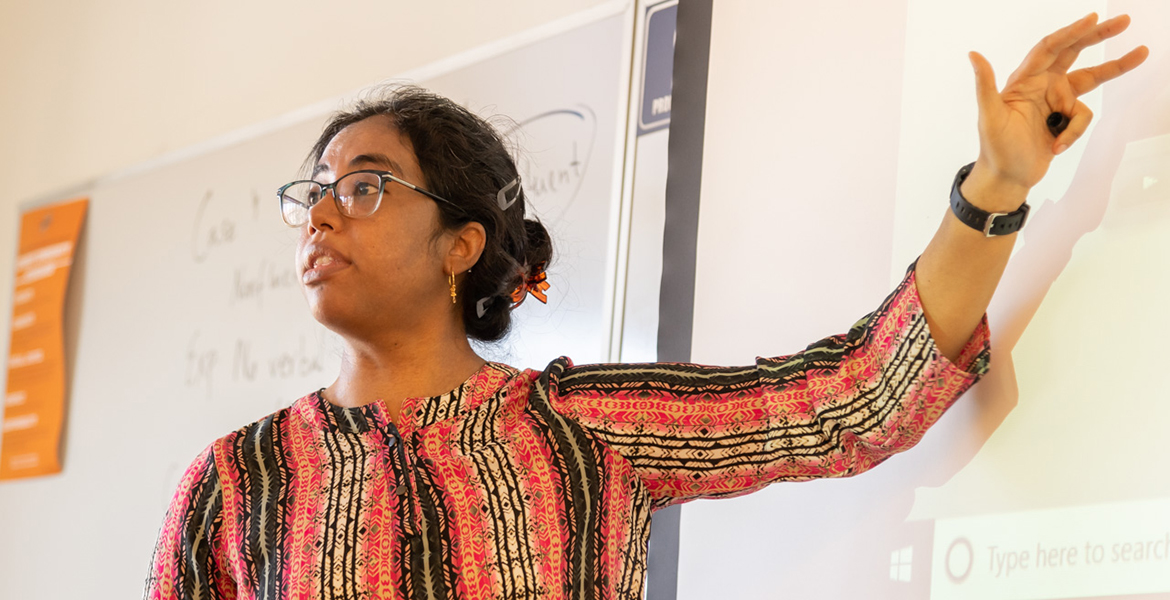
Professor’s passion for audiology, speech-language pathology spans continents
Tuesday, February 4, 2020
For Dr. Sabiha Parveen, it wasn’t so much a question of what she’d study, but rather how she’d go about it.
“I have always been fascinated by the human brain and how we function as humans,” said the assistant professor in the Department of Communication Sciences and Disorders. “I had read about audiology and speech-language pathology in an educational magazine when I was in high school and was really inspired by the scope of the field.”
So after graduating from the University of Calcutta in her home country of India and working for a year in audiology and speech-language pathology, she headed to Bowling Green State University in Ohio for postgraduate work. Although Parveen had initially wanted to focus her studies on aphasia and stroke, her mentor presented another option: Parkinson’s disease.
“At that point I was really open to learning anything I possibly could,” Parveen said. “But I think the Parkinson’s community was the trigger to keep me going. Being able to go to the support groups and meet with people and talk to them led me to my path.”
Working in the College of Arts and Sciences, Parveen gets to explore how the brain works on myriad levels through classes and research. Her undergraduate and graduate courses range from childhood speech development to traumatic brain injury and dementia, while her research remains on Parkinson’s disease.
“I have a passion for people who are seniors and the Parkinson’s community helps me work with that population,” Parveen said. “There’s so much more to be done.”
Parveen has tasked herself with both community- and classroom-based Parkinson’s disease projects. CANe, for example, is a local intervention program Parveen started in partnership with OSU’s Department of Nutritional Sciences; the School of Kinesiology, Applied Health and Recreation; and the Prairie Arts Center. The program’s aim is to improve the quality of life for both Parkinson’s patients and their families through regular classes centered on communication, art, nutrition and exercise.
“We want to educate and create awareness among everyone,” Parveen said, adding that the interconnectedness of CANe’s activities makes it unique. “With other programs, the classes are very segregated. Our appeal is doing it all together, coming all together.”
Aside from what’s taught though CANe — from tai chi to art — Parveen explained the importance of creating a feeling of community among patients and families.
“The programs help break down the myth that you’re alone,” Parveen said. “These local support groups and resources can be ways of checking in. Participants are talking to each other, getting that support and getting that confirmation that they’re on the right track.”
Parveen’s efforts have not gone unnoticed by her colleagues, including Dr. Ramesh Kaipa, head of the Department of Communication Sciences and Disorders.
“Dr. Parveen’s dedication to selflessly serve individuals with Parkinson’s disease sets her apart,” Kaipa said. “She takes her community engagement efforts very seriously and is a very dedicated faculty member.”
Kaipa also noted that Parveen’s training in both the United States and India has “helped her to be a strong advocate for people from diverse backgrounds.” He continued, “In our profession, this is a strong trait, as we frequently deal with people who are not in a position to communicate effectively. Dr. Parveen has been a voice for such individuals over the past several years.”
And Parveen passes that advocacy mindset on to her students, especially as they begin studying how to treat patients.
“I emphasize that you cannot have the same treatment plan for every single person you work with,” Parveen said. “Some of my students want a quick recipe: ‘How do we treat a person with Parkinson’s disease? How do we treat someone with dementia?’ But it has to be personalized because every person is different.”
This striving for individualized care extends beyond Oklahoma’s borders to Parveen’s home country of India through her translation of speech-language pathology treatment resources. Parveen explained that the majority of existing materials are in English, but it’s critical for patients to have access to resources in their native language.
“I’ve been working with a faculty member to create a family handbook in Bengali, which is my first language,” she said. “That’s now helping people with stroke that come to hospitals in India. And they’re getting the book for free.”
Being able to help from afar also allows Parveen to stick around Oklahoma to continue her research.
“I see myself staying at Oklahoma State because it has given me so many opportunities to grow,” Parveen said. “I love that I get to work with so many people and look at all these different aspects. I love coming to work. I’m lucky.”
For more on Dr. Parveen’s Parkinson’s disease support groups, visit stillwaterpdsupport.weebly.com.
STORY: Elizabeth Gosney | Communications Graduate Assistant
MEDIA CONTACT: Jacob Longan | College of Arts and Sciences | 405-744-7497 | jacob.longan@okstate.edu
